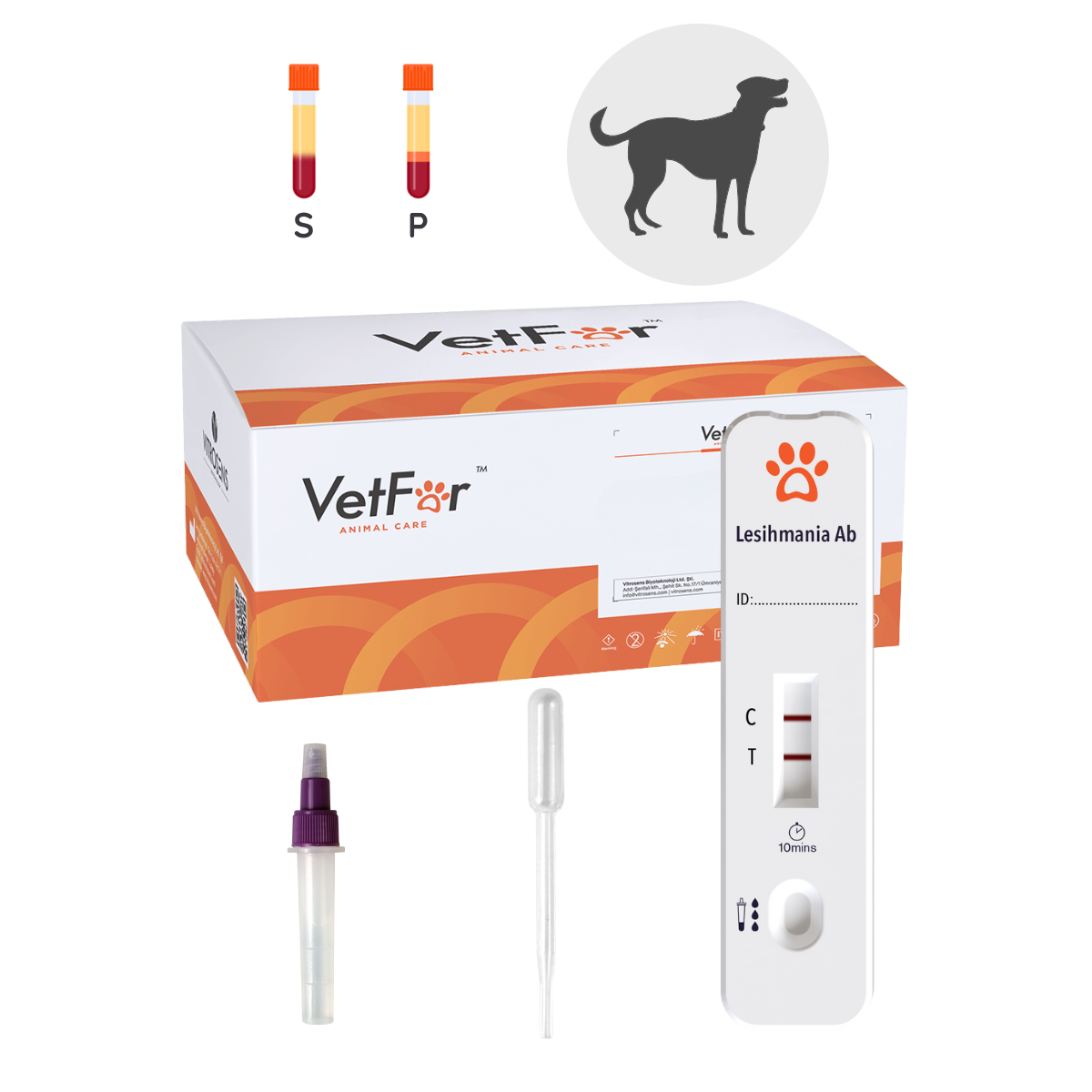Canine Leishmaniose Antibody Test
This rapid test is intended for the detection of specific antibodies against Leishmania infantum in serum or plasma samples from dogs.
58,00 €
| Quantity | Price | Discount |
|---|---|---|
| 3-5 | 56,26 € | 3% |
| 6-9 | 54,52 € | 6% |
| 10+ | 52,20 € | 10% |
| Sample type |
Plasma ,Serum |
|---|---|
| Target specie |
Canine (Dog) |
| Target |
Leishmaniasis (LSH) |
| Packaging unit |
10 Tests |
| Sensitivity |
93,33 % |
| Specificity |
97,77 % |
VetFor™ Leishmania Antibody Rapid Test
The VetFor™ Leishmania Antibody Rapid Test is a veterinary in vitro diagnostic test for the rapid and reliable detection of antibodies against Leishmania infantum in the serum or plasma of dogs.
The test is based on the lateral flow sandwich assay principle and provides clear results within a few minutes. The ready-to-use kit contains all the components required to perform the test and is intended for use by veterinary professionals.
Product details
- Test type: Lateral sandwich immunoassay
- Target parameter: Antibodies against Leishmania infantum
- Sample material: Serum or plasma from dogs
- Result time: Rapid test with direct evaluation after 10 minutes
- Limit of detection: 1 × 10⁴ TCID₅₀ / mL
- Cross-reactivity: No cross-reactivity with distemper virus, herpes virus, Ehrlichia canis, Babesia canis or Toxoplasma gondii detected.
- Storage conditions: 2 – 30 °C
Performance data
-
Sensitivity: 93,33 %
-
Specificity: 97,77 %
-
Accuracy: 95,55 %
Content
- 10 test cassettes
- 10 disposable bottles with diluent
- 10 disposable plastic droppers
- 1 instruction manual
For professional use only!
SHELF LIFE AND STORAGE
- The test kit must be stored at a temperature between 2 °C and 30 °C and a relative humidity of 40% to 60%. All components must be brought to room temperature before testing.
- Do not open sealed pouches and test kits until immediately before use.
- The test is stable until the expiration date. Do not use the test kit after the expiration date. The expiration date is indicated on the label/packaging of the sealed foil pouch.
- Do not expose the test kit to direct sunlight.
NOTES
- For in vitro diagnostic use only.
- For optimal test results, the manufacturer's instructions should be followed precisely.
- The tests should be conducted in compliance with biosafety measures and with protective clothing.
- The test kits must be kept in their sealed packaging until use.
- Do not use the test kit if the pouch is damaged or the seal is broken.
- The components of the test kit must not be reused.
- All components must be brought to room temperature before testing.
- The test kit may only be used up to the indicated expiration date.
- The components of this test kit have been tested as a standard batch.
- Do not exchange or mix components from different test kits.
- Do not touch the uncovered areas of the membrane in the test cassette.
- Inadequate or incorrect sample collection as well as improper storage and transport conditions may falsify the test results.
- All components of the test kit should be disposed of as infectious material.
You must be logged in to post a review.
Canine leishmaniasis is a parasitic disease caused by the protozoan Leishmania infantum. This disease is endemic in many parts of the world, especially in Mediterranean countries, and is transmitted through the bite of infected sandflies.
Course of disease and symptoms
After transmission via the bite of an infected sandfly, the infection usually progresses over months or years. Symptoms can vary and range from nonspecific signs such as weight loss, loss of appetite, lethargy, and skin lesions to more severe conditions such as kidney failure, nosebleeds, and eye problems. Dogs that are not treated can die from the long-term effects of the disease.
Diagnosis
Diagnosis is carried out through serological tests to identify antibodies against Leishmania. PCR (polymerase chain reaction) can also detect the parasite's genetic material. A clinical examination is also important to identify possible symptoms such as skin lesions and swollen lymph nodes.
Therapy
There is no complete cure for canine leishmaniasis, but treatment aims to reduce the parasite load and alleviate symptoms. Medications such as allopurinol and meglumine antimoniate are commonly used. Dogs must be monitored and treated for life to control the disease.
Prevention
Preventive measures against leishmaniasis include protection from sandfly bites. This can be achieved through insect repellents, specially designed collars, or spot-on products. In high-risk areas, vaccination against Leishmania can also help reduce the risk of clinical disease.
References
- Paltrinieri, S., Solano-Gallego, L., Fondati, A., Lubas, G., Gradoni, L., Castagnaro, M., Crotti, A., Maroli, M., Oliva, G., & Roura, X. (2010). Guidelines for diagnosis and clinical classification of leishmaniasis in dogs. Journal of the American Veterinary Medical Association, 236(11), 1184–1191. Available at: https://avmajournals.avma.org/abstract/journals/javma/236/11/javma.236.11.1184.xml
- World Health Organization (WHO). (2023). Leishmaniasis. Available at: https://www.who.int/en/news-room/fact-sheets/detail/leishmaniasis
- LeishVet. (n.d.). Diagnosis. Available at: https://www.leishvet.org/fact-sheet/diagnosis/
translated from German version


Reviews
Clear filtersThere are no reviews yet.